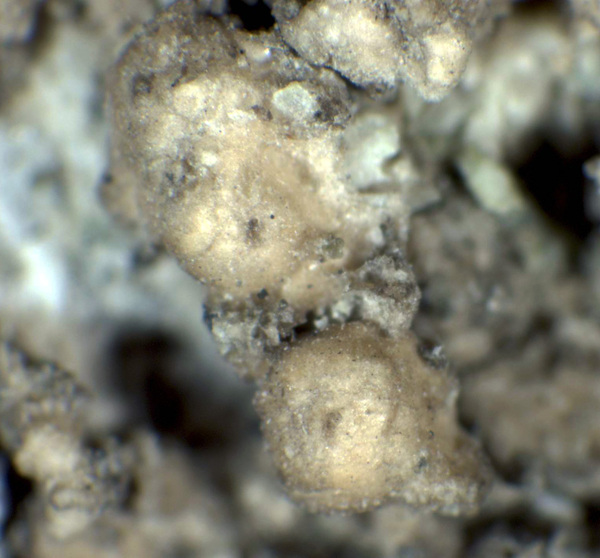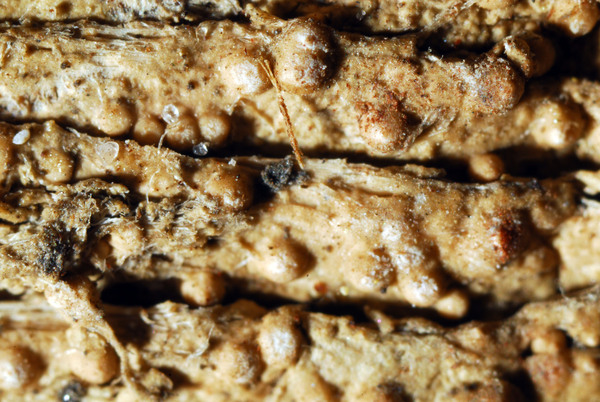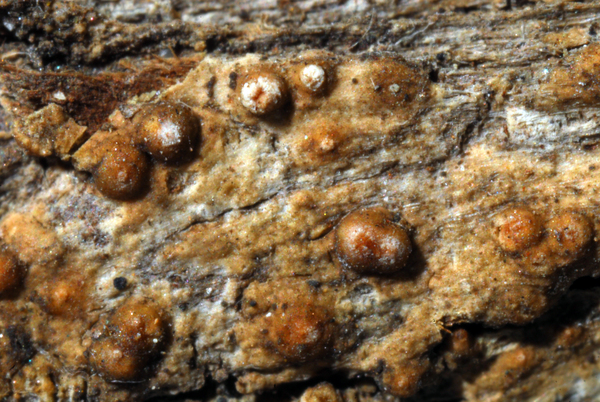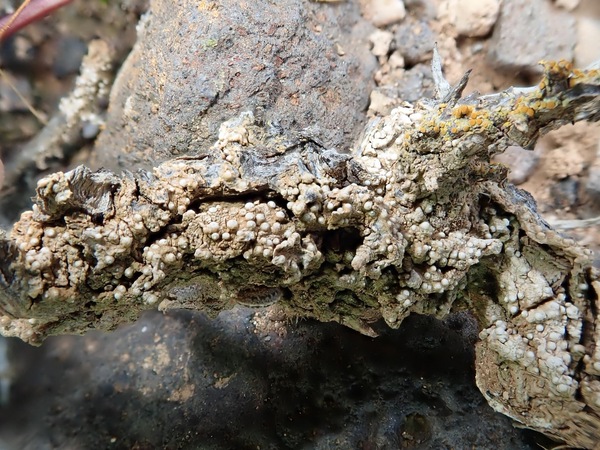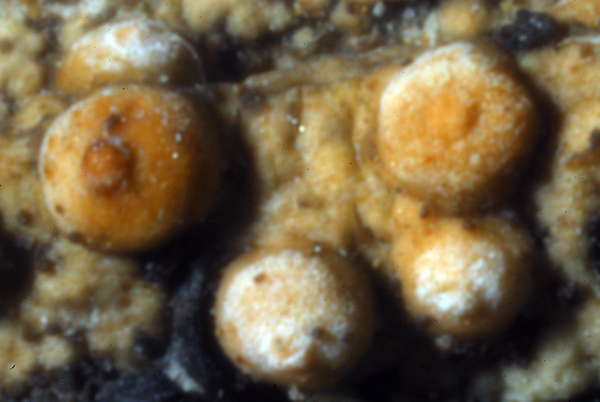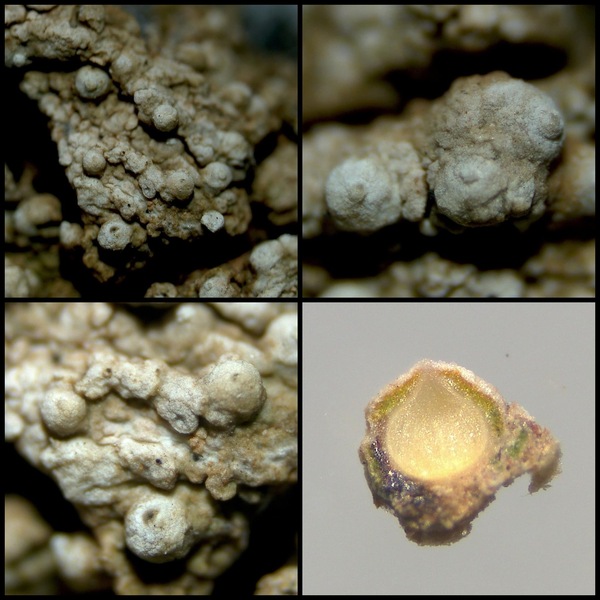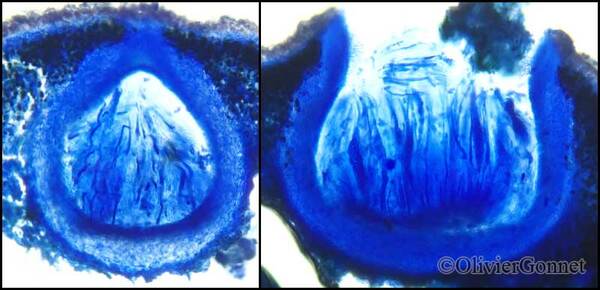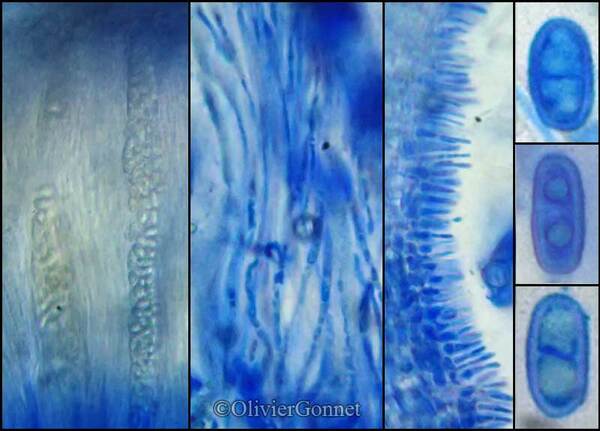Thelopsis isiaca Stizenb.
Ber. St. Gall. naturw. Ges.: 262, 1895.
Synonyms: Thelopsis subporinella Nyl.
Distribution: N - Lig. C - Tosc, Laz (TSB 31406), Sar (Ravera & al. 2021c). S - Pugl (Nimis & Tretiach 1999), Bas (Potenza 2006, Potenza & al. 2010, Potenza & Fascetti 2012), Cal (CLU 10495), Si (Nimis & al. 1994, 1996b, Grillo & Carfì 1997, Grillo 1998, Grillo & al. 2002, Grillo & Caniglia 2004, Ottonello & Puntillo 2009, Ottonello & al. 2011).
Description: Thallus crustose, thinly episubstratic, rarely endosubstratic, continuous to faintly rimose, yellowish grey to pinkish grey, appearing verrucose due to the numerous fertile warts, sometimes delimited by a whitish prothallus. Cortex colourless, 20-30 μm thick, the hyphae with gelatinized walls, overlain by an epinecral layer. Perithecia subglobose, 0.3-0.6 mm across, immersed in 0.6-1 mm wide, raised thalline warts, the ostiolar region visible as a slightly darker dot. Exciple colourless or yellowish, especially around the ostiole, of compressed cells; hymenium colourless or yellowish, I+ blue-green turning reddish (mainly due to ascus walls); periphyses septate, well developed in the periostiolar region, 10-25 x c. 1 µm; paraphyses simple, slender, flexuose, c. 1.5 µm thick, the apical cells not swollen. Asci 100-150-spored, cylindrical, tapering towards the apex, the wall thin, 1+ light blue, without a tholus. Ascospores at first 1-celled, then 1-septate, hyaline, ellipsoid, (10-)12-18 x (4-)5-9 µm, thin-walled, surrounded by a thin gelatinous perispore. Pycnidia immersed. Conidia ellipsoid to ovoid, 3-5 x 1-1.5 µm, or thread-like, 18-20 x c. 1 μm. Photobiont trentepohlioid. Spot tests: thallus K-, C-, KC-, P-, UV-. Chemistry: without lichen substances. Note: a Mediterranean-Macaronesian species also known from western North America, found on base-rich rocks, soil, mosses, tree bark, in situations protected from rain; mostly Tyrrhenian, locally abundant in coastal situations, such as in some islands of Southern Italy. It is included in the Italian red list of epiphytic lichens under the “Least Concern” category (Nascimbene & al. 2013c).
Growth form: Crustose
Photobiont: Trentepohlia
Reproductive strategy: mainly sexual
Most common in areas with a humid-warm climate (e.g. most of Tyrrenian Italy)
In underhangs rarely wetted by rain
Taxon bound to maritime-coastal situations
Commonnes-rarity: (info)
Alpine belt: absent
Subalpine belt: absent
Oromediterranean belt: absent
Montane belt: absent
Submediterranean belt: absent
Padanian area: absent
Humid submediterranean belt: absent
Humid mediterranean belt: very rare
Dry mediterranean belt: extremely rare
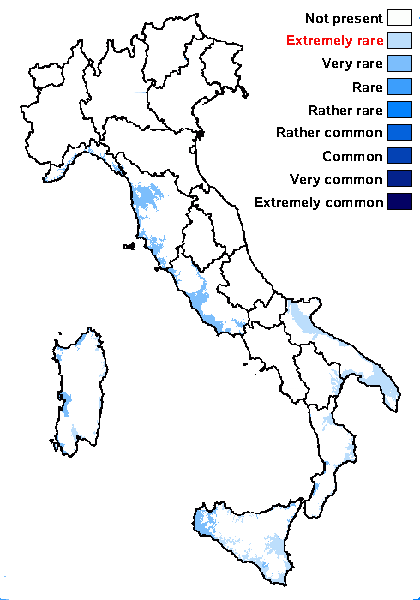
Predictive model
Herbarium samples
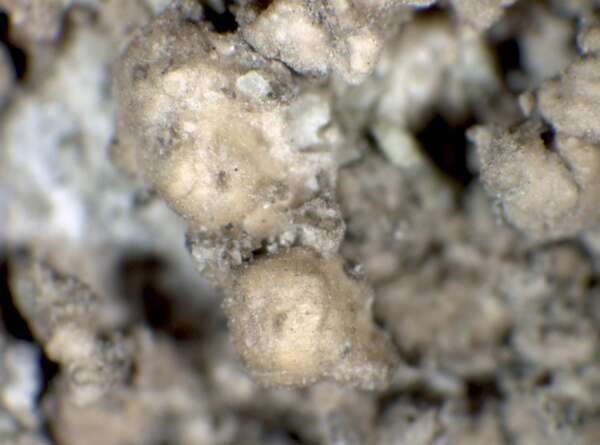

P.L. Nimis; Owner: Department of Life Sciences, University of Trieste
Herbarium: TSB (9501)
2001/12/03
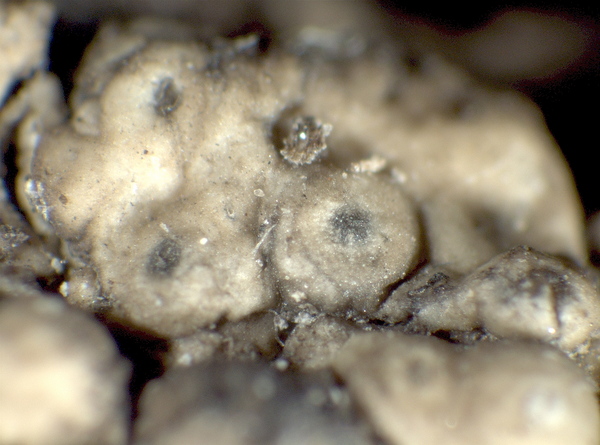

P.L.Nimis; Owner: Department of Life Sciences, University of Trieste
Herbarium: TSB (38362)
2008.02.25
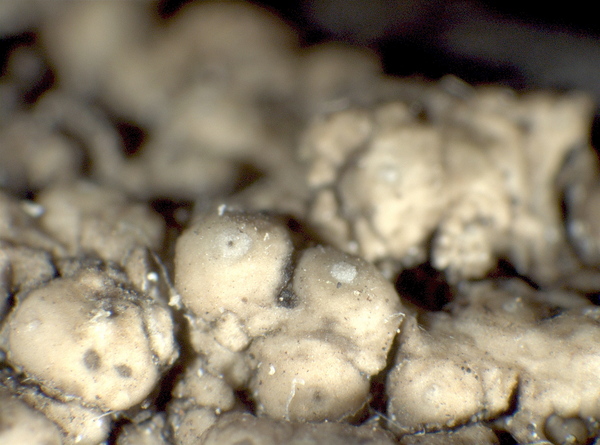

P.L.Nimis; Owner: Department of Life Sciences, University of Trieste
Herbarium: TSB (38362)
2008.02.25
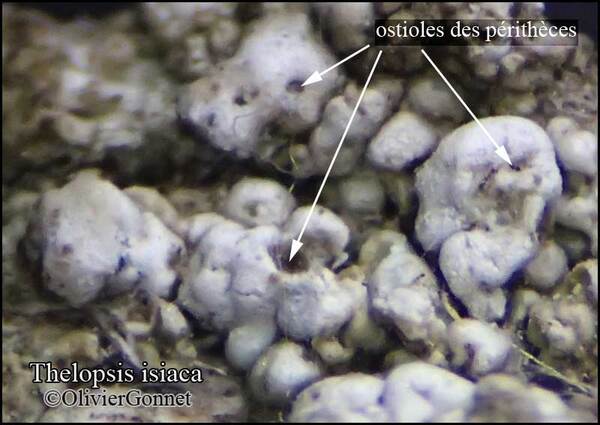
Courtesy Danièle et Olivier Gonnet - Source: https://www.afl-lichenologie.fr/Photos_AFL/Photos_AFL_T/Textes_T2/Thelopsis_isiaca.htm
France, 22/5/2014 - sur écorce de Cupressus, ouvrage du Libron - Hérault
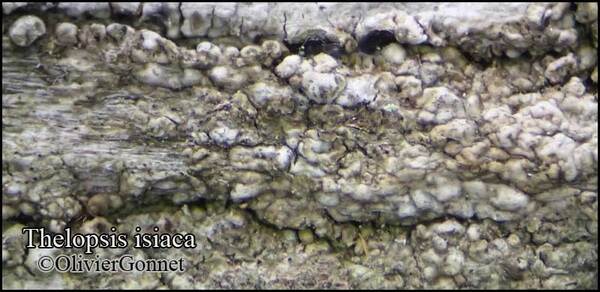
Courtesy Danièle et Olivier Gonnet - Source: https://www.afl-lichenologie.fr/Photos_AFL/Photos_AFL_T/Textes_T2/Thelopsis_isiaca.htm
France, 22/5/2014 - sur écorce de Cupressus, ouvrage du Libron - Hérault
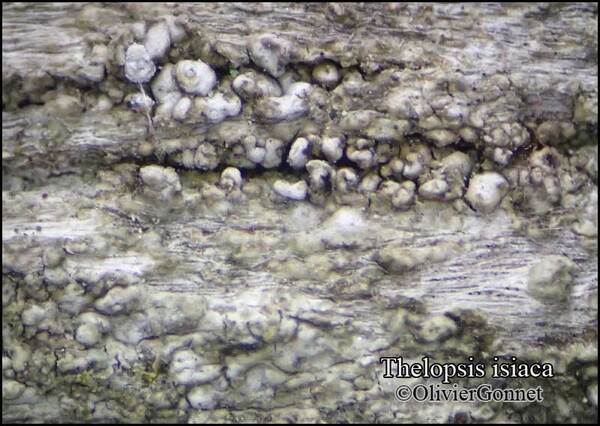
Courtesy Danièle et Olivier Gonnet - Source: https://www.afl-lichenologie.fr/Photos_AFL/Photos_AFL_T/Textes_T2/Thelopsis_isiaca.htm
France, 22/5/2014 - sur écorce de Cupressus, ouvrage du Libron - Hérault
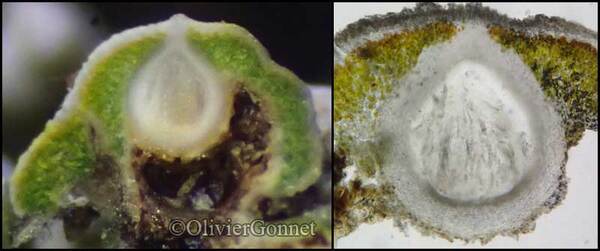
Courtesy Danièle et Olivier Gonnet - Source: https://www.afl-lichenologie.fr/Photos_AFL/Photos_AFL_T/Textes_T2/Thelopsis_isiaca.htm
France, 22/5/2014 - sur écorce de Cupressus, ouvrage du Libron - Hérault
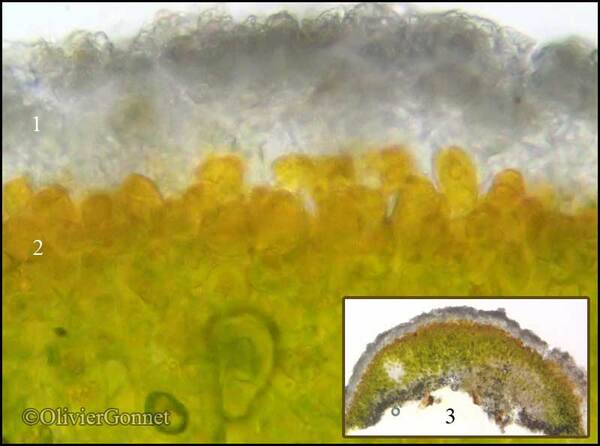
Courtesy Danièle et Olivier Gonnet - Source: https://www.afl-lichenologie.fr/Photos_AFL/Photos_AFL_T/Textes_T2/Thelopsis_isiaca.htm
France, 22/5/2014 - sur écorce de Cupressus, ouvrage du Libron - Hérault
Growth form: Crustose
Photobiont: Trentepohlia
Reproductive strategy: mainly sexual
Most common in areas with a humid-warm climate (e.g. most of Tyrrenian Italy)
In underhangs rarely wetted by rain
Taxon bound to maritime-coastal situations
Commonnes-rarity: (info)
Alpine belt: absent
Subalpine belt: absent
Oromediterranean belt: absent
Montane belt: absent
Submediterranean belt: absent
Padanian area: absent
Humid submediterranean belt: absent
Humid mediterranean belt: very rare
Dry mediterranean belt: extremely rare

Predictive model
| Herbarium samples |


P.L. Nimis; Owner: Department of Life Sciences, University of Trieste
Herbarium: TSB (9501)
2001/12/03


P.L.Nimis; Owner: Department of Life Sciences, University of Trieste
Herbarium: TSB (38362)
2008.02.25


P.L.Nimis; Owner: Department of Life Sciences, University of Trieste
Herbarium: TSB (38362)
2008.02.25

Courtesy Danièle et Olivier Gonnet - Source: https://www.afl-lichenologie.fr/Photos_AFL/Photos_AFL_T/Textes_T2/Thelopsis_isiaca.htm
France, 22/5/2014 - sur écorce de Cupressus, ouvrage du Libron - Hérault

Courtesy Danièle et Olivier Gonnet - Source: https://www.afl-lichenologie.fr/Photos_AFL/Photos_AFL_T/Textes_T2/Thelopsis_isiaca.htm
France, 22/5/2014 - sur écorce de Cupressus, ouvrage du Libron - Hérault

Courtesy Danièle et Olivier Gonnet - Source: https://www.afl-lichenologie.fr/Photos_AFL/Photos_AFL_T/Textes_T2/Thelopsis_isiaca.htm
France, 22/5/2014 - sur écorce de Cupressus, ouvrage du Libron - Hérault

Courtesy Danièle et Olivier Gonnet - Source: https://www.afl-lichenologie.fr/Photos_AFL/Photos_AFL_T/Textes_T2/Thelopsis_isiaca.htm
France, 22/5/2014 - sur écorce de Cupressus, ouvrage du Libron - Hérault

 Index Fungorum
Index Fungorum
 GBIF
GBIF
